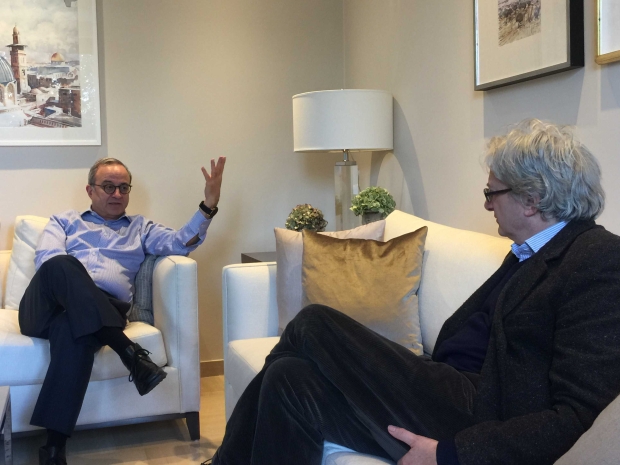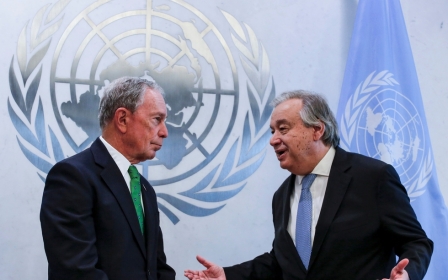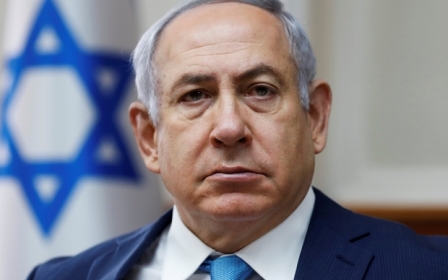‘It’s dead’: Peace architect gives up hope for Israel-Palestine two-state solution

AMMAN - The main architect of the Arab Peace Initiative, which offered Israel recognition in exchange for a full withdrawal from the occupied territories, says that the two-state solution is dead.
Marwan Muasher, who was Jordan’s foreign minister at the time of the initiative in 2002, told Middle East Eye: “Some people will say it [the two-state solution] never lived, but it is certainly dead today.
“No amount of negotiations today are going to reach a two-state solution, because one of the parties does not want it, the Israeli party"
“No amount of negotiations today are going to reach a two-state solution, because one of the parties does not want it, the Israeli party, and the sponsor of such talks is now totally biased towards the Israelis. Under these conditions, you can no longer cling onto an old model.”
The veteran diplomat, who was Jordan’s first ambassador to Israel and a former ambassador to the US, said Jordan now felt vulnerable to an agenda dictated by Israel and pushed by Washington.
“If there is no two-state solution, with the presence of such an Israeli government, then one of the very likely scenarios is that the Israeli government will work for a solution at Jordan's expense,” Muasher said.
“They are faced with a choice of giving the Palestinians rights in a two-state solution, or have somebody else take care of the problem. They don’t really care about Jordan's well-being today.
“So we are very vulnerable and worried about it and that explains why Jordan has always been an ardent supporter of the two-state solution because it was in Jordan's interest, not just the Palestinians' interest. Today that has evaporated.”
Few Arab diplomats have invested as heavily in the two-state solution as Muasher, who played a central role in developing the Arab Peace Initiative and the Middle East Roadmap.
The Arab Peace Initiative, proposed by the late King Abdullah of Saudi Arabia, has gone down in the history of the conflict as an opportunity wasted by Israel and the then-US president George W Bush. It was embraced by then-Palestinian leader Yasser Arafat and supported by his successor Mahmoud Abbas.
Muasher said the current US initiative, which Donald Trump has called the “deal of the century”, was dead in the water.
The new proposal is thought to exclude two key elements of what were called the “final status” negotiations during the Oslo peace talks: the determination of East Jerusalem as the capital of a future Palestinian state; and the right of return for Palestinian refugees.
Muasher has called the Trump deal “pure fantasy” and said there was no Palestinian in the world who could agree to such a deal.
Read:
“The Trump administration have this idea that they can take Jerusalem out, take the refugees out, without even a symbolic right of return and with the reduction of funds for UNWRA [the United Nations Relief and Works Agency], take the Jordan Valley out, take the settlements out, and you can negotiate the rest.
“It’s crazy. That is not a ‘deal of the century’ to anybody but the Israelis.”
Jerusalem: Source of friction with Riyadh
Muasher, a Jordanian Christian, said that Jerusalem was important to every Arab, and highlighted the decline in the Christian population in the holy city. Christians constituted 20 percent of the population at the turn of the 20th century – now they are less than one percent.
“The number of Christians in Jerusalem today is less than 4,000 people,” said Muasher, “which means we might face a situation in a generation's time when Christian holy places become museums where nobody lives. That’s dangerous to the idea of diversity and co-existence in Palestine and the Arab world. It’s not just Arab Christians who are worried about this. Muslims do not want the Christians to disappear from the city.”
"Nobody wants Abu Dis. People want the holy places. The rest is all gimmicks"
The former Jordan diplomat was also scathing about the role that Saudi Crown Prince Mohammed bin Salman has played in attempting to convince the Palestinian President Mahmoud Abbas to accept Abu Dis, a suburb of East Jerusalem, as the future capital of a Palestinian state.
“Pure fantasy,” Muasher said. “Nobody wants Abu Dis. People want the holy places. The rest is all gimmicks. They say: ‘Let's give them Abu Dis and they will forget about the holy places.’ You can forget about everything else except the holy places.
“There is no way the Saudis can say, even to their own people, that even if the Palestinians cannot accept such a deal, we think it should be accepted.”
Muasher acknowledged that Jerusalem was a source of friction with Riyadh. Jordan’s custodianship of the city’s holy places was written into the Wadi Araba peace treaty with Israel. He said the late King Hussein went into the 1967 war with Israel knowing that he would lose, but that he always felt responsible for losing Jerusalem.
Muasher said: “It is also part of the legitimacy of the Hashemites. Legitimacy is very important in the Arab world. It has allowed us to withstand all the turmoil of the Arab Spring, because the monarchy in Jordan is not threatened in the way that the systems in Egypt and Tunisia were. People want reform within the system rather than outside it. Jerusalem plays a big part in this.”
Has the moment passed?
Muasher said the moment for a deal between Arab states and Israel had passed. Factors include that there is no Arab of the stature of the late King Abdullah of Saudi Arabia; the war in Syria, which formed a key part of the initiative; and Arab public opinion, which is against any such rapprochement.
"This generation is not interested in a two-state solution, not because it does not believe in a Palestinian state, but because it understands it cannot be realised. And it cannot"
Instead, Musaher said, a new generation of Palestinians had moved away from the debates about the shape of the solution to the conflict and towards focusing on their own civil rights. This means there will be more emphasis on raising the cost to Israel of the occupation through recourse to UN bodies, the International Criminal Court and the BDS campaign.
“This generation is not interested in a two-state solution, not because it does not believe in a Palestinian state, but because it understands it cannot be realised. And it cannot.
“So if it cannot come to pass, they will focus instead on a rights-based approach, and if that takes them to a one-state solution, they don't care. They want their rights now.”
This article is available in French on Middle East Eye French edition.
New MEE newsletter: Jerusalem Dispatch
Sign up to get the latest insights and analysis on Israel-Palestine, alongside Turkey Unpacked and other MEE newsletters
Middle East Eye delivers independent and unrivalled coverage and analysis of the Middle East, North Africa and beyond. To learn more about republishing this content and the associated fees, please fill out this form. More about MEE can be found here.





